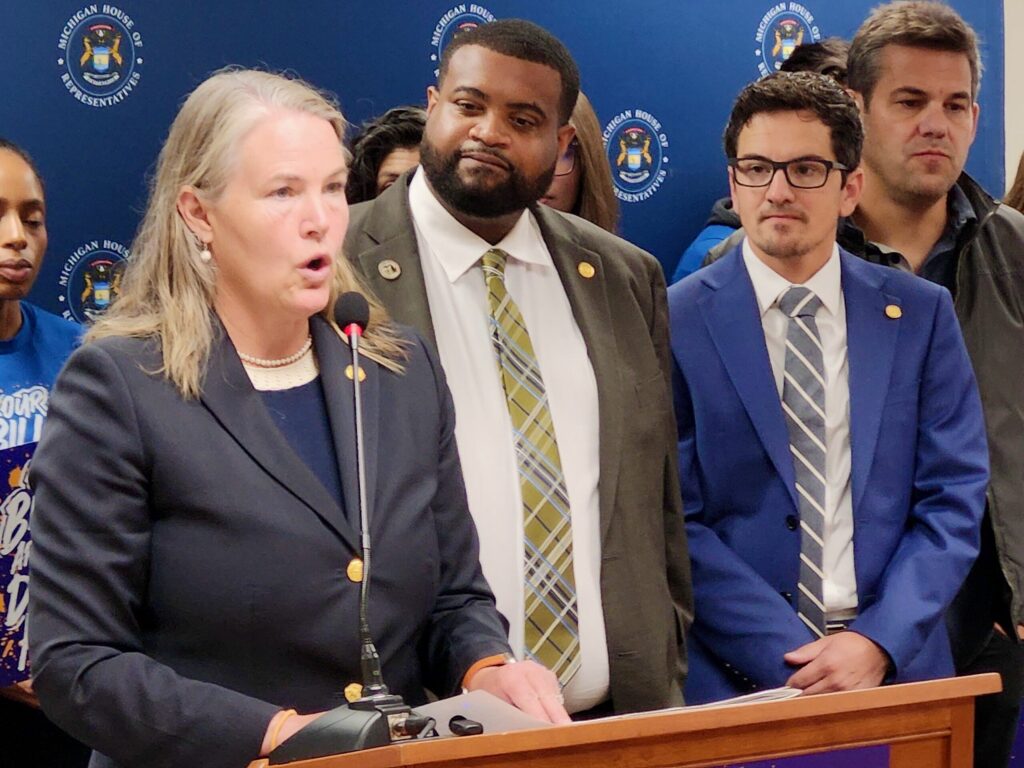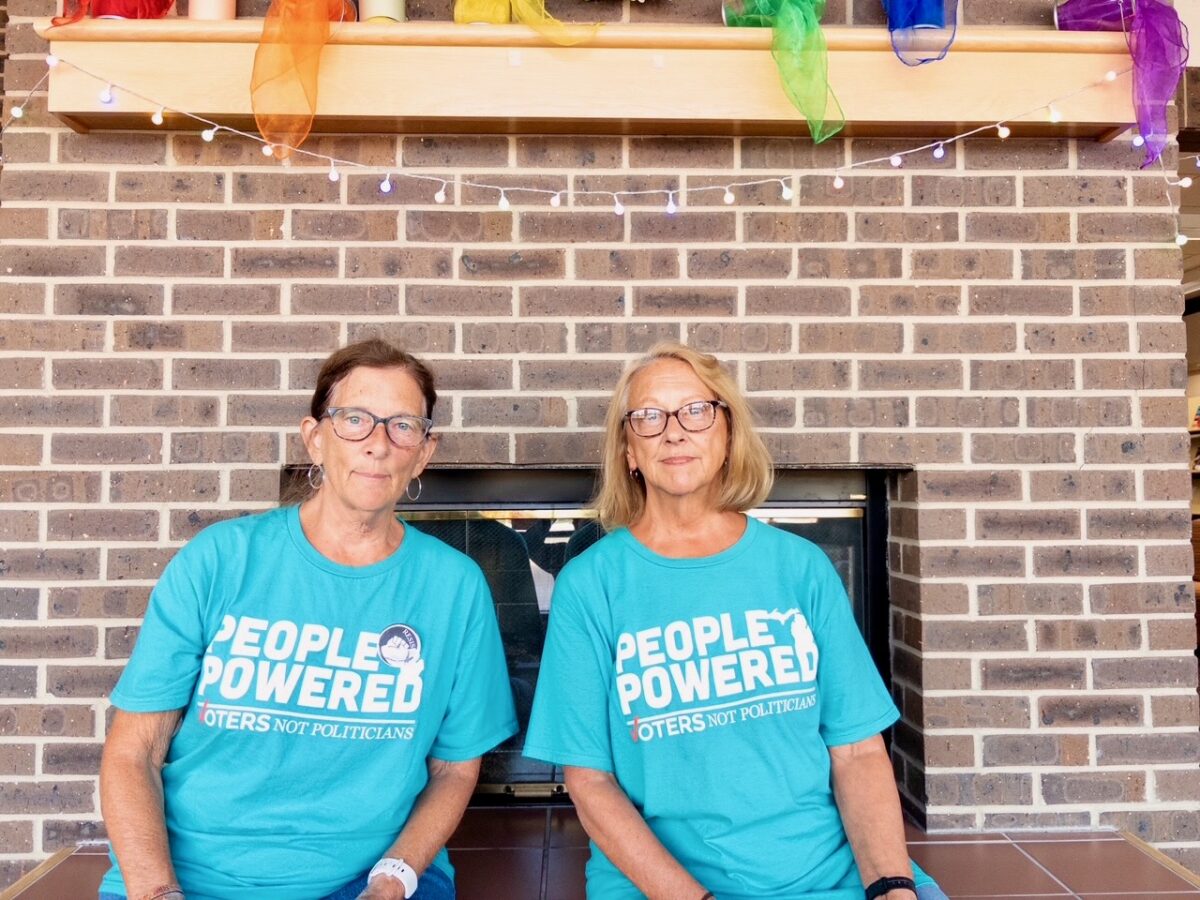Overview:
- The legislation would guarantee fair compensation for Michiganders when the power is out for long stretches, including renters, says state Rep. Donavan McKinney.
- The bills have a high hurdle to clear in the GOP-controlled House in order to reach Gov. Gretchen Whitmer's desk.
- DTE, Consumers have rate hike requests totaling $1 billion that are pending before the state.
By BEN SOLIS
Michigan Advance
Skyrocketing energy prices, poor service, unfair outage compensation, out-of-control pay for utility executives, and their perceived outsized influence on Michigan politics are addressed in a legislative package to be introduced soon by Democrats in the House and Senate.
A coalition of advocates and lawmakers behind the bills held a news conference on Tuesday to discuss the legislation, and the need for a Michigan ratepayers’ “bill of rights.”
The legislation would protect utility customers in Michigan from policies that allow the state’s utilities – DTE Energy Company and Consumers Energy – to prioritize people over profits. It also stands to face a tough road ahead, as it’s unclear how the Republican-controlled House of Representatives might view the policies.
Even if the package is produced in the Senate and passes muster with the Democrats in control of the chamber, the package has a high hurdle to clear in the House in order to reach Gov. Gretchen Whitmer’s desk.
A message seeking comment from the House Republican caucus on the legislation was not returned at the time of publication.
Ratepayer legislation would compensate Michiganders for power outages
State Rep. Donavan McKinney (D-Detroit) said the bill of rights being crafted by Democrats in the House and Senate is long overdue. First and foremost, McKinney said the legislation would guarantee Michiganders have the right to fair compensation when power goes out for long periods of time, including renters.
“Other states have done this. So can Michigan,” McKinney said.
“We’re going to start tying any rate increases to the performance of the utility companies. You know, that novel concept in this country that you have to do a good job to get paid. It’s called performance-based rate making, and it’s being done in other places. This ratepayer Bill of Rights also cracks down on utility companies that make everyday households pay for the perks of millionaire utility executives with auto control salaries.”
The proposed bill of rights would also ensure residents no longer pay the highest energy costs in the Midwest; protect residents from paying for CEO bonuses and other luxuries; ban political contributions to state lawmakers from the utilities; and ensure residents can generate their own reliable energy through solar arrays on their homes or with their neighbors.
Katie Carey, a spokesperson for Consumers Energy, told Michigan Advance in a statement that the company’s rates are used to invest in the natural gas or electric system, and that delivers reliable and affordable energy to its customers.
“Specifically for the electric side of the business, our Reliability Roadmap has delivered meaningful results in 2024 to customers, including a 12% reduction in the amount of time an average customer went without power,” Carey said. “We have mapped out the strategy and tactics that should continue leading to fewer and shorter power outages and hope other stakeholders will work with us to help us serve Michigan.”
A message seeking comment from DTE was not returned at the time of publication.
MORE FROM PLANET DETROIT
DTE Energy must face Zug Island pollution litigation: Federal judge
A federal judge says there is evidence demonstrating that DTE Energy exercised control over EES Coke Battery’s emissions on Zug Island.
Transfer prices and your bill: What Michigan’s clean energy law means for you
In Michigan, the Public Service Commission’s deliberations on clean energy pricing and utility credits impact how quickly the state converts to renewable energy.
Group behind effort to ban DTE, Consumers political spending lays groundwork
Organizers behind proposed ballot initiative to ban political spending by Michigan utilities hold town halls to educate voters and volunteers.
DTE, Consumers request $1 billion in rate hikes
Sen. Sue Shink (D-Northfield Township), said Michigan residents are faced with prices going up on all manner of goods and services, and that’s forced some of the state’s most vulnerable citizens to make choices on whether to pay for other things instead of their utility bills.
If they can’t pay, Shink said those services would be cut off by the provider, which could be detrimental during days of high heat in the summer or trembling cold in the winter months.
The biggest hurdle is out of control energy costs, Shink added.
“Michiganders are watching with dismay as the two utilities file for another $1 billion rate hike. The outrageous thing is that DTE submitted this latest rate hike just a couple months after receiving a $217 million increase on all of us, and not even two years before that, they fought for a $368 million rate hike,” Shink said. “Now they’re asking to increase our rate by another 11%.”
Shink said that DTE shareholders were paid $835 million in 2024 and maintained some of the worst utility service in the nation.
“Meanwhile, DTE’s CEO last year made $12.8 million. That’s a 23% increase over his salary the year before,” Shink said. “I want to break that down just a little bit. At $12.8 million a year, that’s $213,000 a month. That’s $46,900 a day. That’s almost two times the salary of a minimum wage earner per year in a day … That’s just wrong.”
Shink and other legislators attending the news conference said their response to a broken system was a new bill of rights to balance the scales.
“It’s the antidote to how we address energy affordability issues and bring prices down in Michigan. It’s how we restore trust with our constituents who want to know that policy makers are setting energy policy, not utility CEOs and their lobbyists,” Shink said.
“Things have gotten so bad that residents in my district, in Ann Arbor, announced recently that they are launching a local ballot initiative to establish our own municipal power system in order to cut ties with DTE altogether.”

Michigan remains at the bottom in the nation for electric reliability and has some of the highest rates.
McKinney said that was because the utilities have not invested enough into bolstering the state’s grid despite the large sums of money those companies rake in.
“The neglect over years has been so detrimental that in testimony, DTE, I believe, had said that they have power lines in operation from the early 1900s still in operation today,” McKinney said. “No wonder the power keeps going out when there’s just a little bit of wind and the sun is out like today. People are fed up.”
Rep. Jason Morgan (D-Ann Arbor) added that the grid was in such dire shape because utilities have “pocketed the profits rather than investing in people.”
“Now they’re asking us to pay for them to actually do their job and provide reliable power,” Morgan said. “I think the ultimate cause of that is the money that they have contributed in our political system. That has had a significant role in legislators over the last several decades, now holding them accountable to the people.”
As to whether Republicans in the House will support the measures, McKinney told reporters at the news conference the issue of high utility rates with lackluster service affects every Michigander, regardless of political affiliation.
“Every single Michigan out there, we’re hearing your voice, no matter if you’re Democrat, Republican, independent, it doesn’t matter,” McKinney said. “I’m getting calls every single day about this issue. I got Republicans who hate my guts, but they’re like, ‘Hey, we’re with you on this issue.’”
A separate ballot proposal being shopped by Michiganders for Money Out of Politics also seeks to address the influence utilities have in state politics. The proposal would ban political contributions from the companies, which are considered regulated monopolies.
The Michigan Board of State Canvassers approved the proposal for signature collection in August.
Michigan Advance is part of States Newsroom, a nonprofit news network supported by grants and a coalition of donors as a 501c(3) public charity. Michigan Advance maintains editorial independence. Contact Editor Jon King for questions: info@michiganadvance.com.





